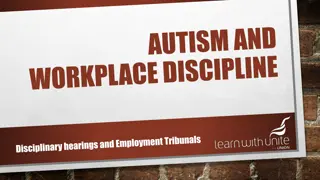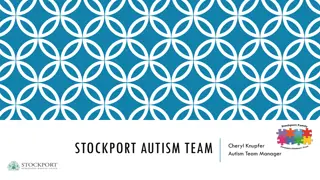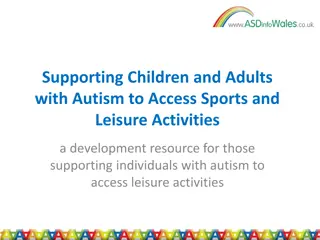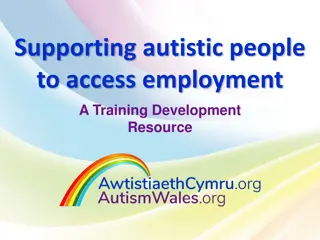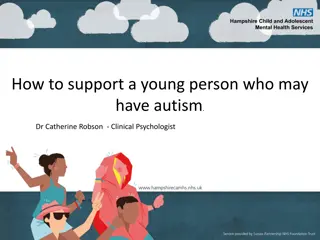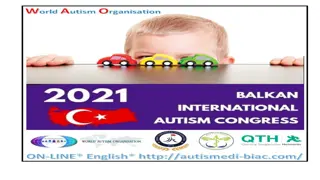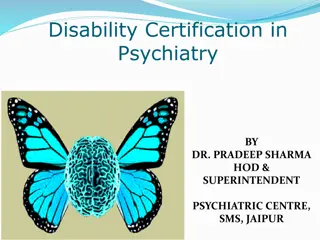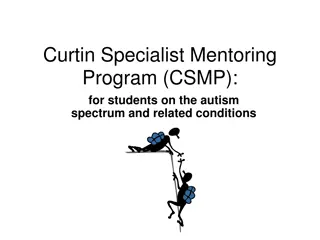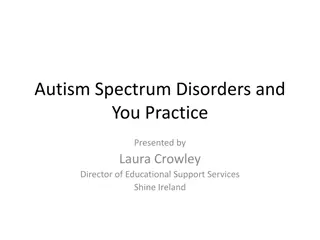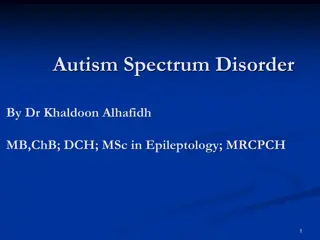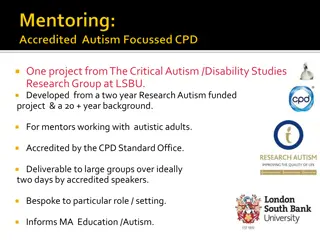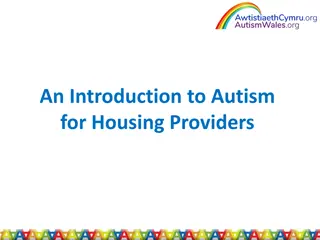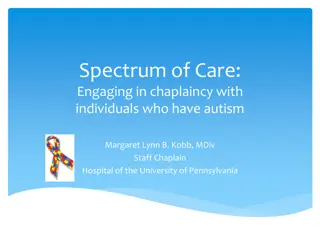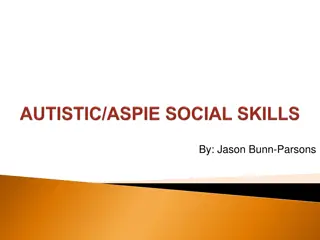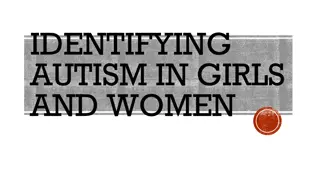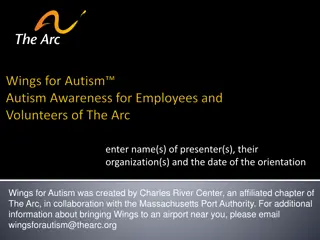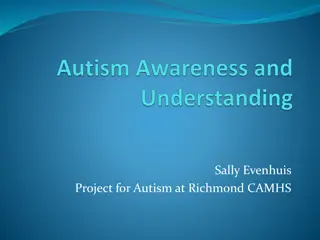Understanding Autism: A Comprehensive Overview
Autism, a hidden disability, presents challenges in social interaction, communication, and sensory processing. It is a lifelong condition that affects individuals in various ways. Recognizing the signs and understanding the needs of autistic individuals can greatly impact their lives. This introduction provides insights into autism, including its various names, prevalence, and common characteristics. Social communication and interaction differences are highlighted, emphasizing the importance of support and awareness in improving the lives of those with autism.
Download Presentation

Please find below an Image/Link to download the presentation.
The content on the website is provided AS IS for your information and personal use only. It may not be sold, licensed, or shared on other websites without obtaining consent from the author. Download presentation by click this link. If you encounter any issues during the download, it is possible that the publisher has removed the file from their server.
E N D
Presentation Transcript
An Introduction to Autism
What Is Autism? Autism is a hidden disability , meaning it is not easy to recognise when someone has the condition. When you see the following pattern (on a wristband, card or mobile device) it means someone has autism and wants you to know so that you can support them: Autistic people often have difficulty in accessing community activities, leisure facilities and other services. Everyone having a better understanding of autism has the power to change lives. The following information is provided to help you to gain a better understanding of autism and suggests ways in which you can support autistic people. For more information on the Can You See Me? scheme, please visit: AutismWales.org/en/i-am-autistic/resources-for-you/can-you-see-me/
What Is Autism? Autism is also known by other names, including: Autism Spectrum Disorder (ASD) Asperger s Syndrome Autistic Spectrum Condition (ASC) Pervasive Developmental Disorder
What Is Autism? Autism is a lifelong condition and affects people from all backgrounds. Currently more males than females are diagnosed with autism. It is estimated that 1 in every 100 people in the UK have an Autism Spectrum Disorder (ASD). Many people are unaware that they are autistic. This is especially true for adults.
What Is Autism? Autistic people have differences in the following areas: Social Imagination and Flexibility of Thought Social Communication & Social Interaction Unusual sensory responses Restricted, repetitive interests or activities Restricted, repetitive patterns of behaviour
Social Communication & Social Interaction
Social Communication & Social Interaction Autistic people experience social communication differences. The way this affects a person can vary, and can include difference in the use and understanding of: speech language gestures toneof voice eyecontact
Social Communication & Social Interaction How this impacts on day to day life: People often use body language and sarcasm to convey something. Autistic people may be perceived as rude because they avoid eye contact. Their tone of voice may not always reflect the way an autistic person is feeling. Autistic people often find these difficult to understand. Autistic people may interpret language literally and so may misunderstand idioms ( pull your socks up ) and metaphors ( my head was spinning ). An autistic person may not be able to use gestures or interpret other people s gestures.
Social Communication & Social Interaction Autistic people experience social interaction differences. The way this affects a person can vary, and can include difference in the use and understanding of: engaging in conversation buildingandsustaining relationships understanding humour giving and receiving compliments showingconcernforothers
Social Communication & Social Interaction How this impacts on day to day life: Developing and maintaining friendships and relationships can be difficult for everyone. Autistic children may find it difficult to take turns and share. Autistic children may find it difficult to instigate or join in play with other children. Autistic adults have told us that they find this particularly difficult. This does not mean that they do not want relationships and friends. This can cause problems with friendships. Autistic people may not engage in conversation in the same way, and enjoy discussing factual issues rather than small talk. Autistic people may have difficulty in understanding the rules of social relationships. This may cause many issues including them offering truthful opinion rather than a tactful one. You may have to be specific when you want to bring the conversation to end.
Impairments in social imagination Social Imagination and Flexibility of Thought Autistic people experience social imagination differences. The way this affects a person can vary, and can include difference in the use and understanding of: predicting reactions and events problem solving relating to others coping with changes planning
Social Imagination and Flexibility of Thought How this impacts on day to day life: Playing team games often relies on social imagination to predict how other people will interact in the game. When problem solving, we rely on our social imagination to predict possible outcomes. Autistic people may find it difficult to predict how others may be feeling or how they will react due to problems with social imagination. This is difficult for an autistic person. This can be difficult for autistic people. Some autistic people have difficulties with creative imagination. Coping with changes can be difficult without good social imagination. Planning can be difficult without good social imagination, autistic people often use calendars or planners to help them with this. Others have good creative imagination, and only the social imagination is affected. Autistic people usually prefer routines to unpredictability.
Unusual Sensory Responses Many autistic people can have sensory issues. The person s perception of the senses can be heightened or decreased. All the senses can be affected. tactile (touch) (movement) vestibular proprioceptive (body position) (looking) visual auditory (hearing) (smell) olfactory gustatory (taste)
Unusual Sensory Responses How this impacts on day to day life, both positively and negatively: Sensory joy from the feel of certain materials stimming Sensory joy from certain colours Decreased feelings of pain Difficulties around noisy traffic Sensitivity to lighting in shops Dislike of certain colours Inability to tolerate certain smells Distress/anxiety in busy environments Sensitivity to touch
What Is Autism? How you can help: Being aware of Autism and the differences experienced by autistic people is key. Ask the autistic person, carers or seek advice from others. Be understanding, people with autism have a lot to offer but may need support. Consider how you can adapt the environment to decrease sensory issues (decrease noise, dim lighting, find a quiet space etc.) Adapt your communication style.
Adapt Your Communication Communication - adapting your communication can help an autistic person: Avoid relying on gesture, facial expression or tone of voice Allow time for the person to process information Speak slowly and clearly Don t use idioms or metaphors Keep instructions short
Further Information For further information on autism, please watch the What Is Autism? film by visiting and complete the questionnaire and to get your personalised Autism Awareness certificate, please visit: AutismWales.org/en/parents-carers/what-is-autism/ You can also apply to become an Autism Aware organisation. For more information, please visit: AutismWales.org/en/education/autism-aware-certification/autism-aware-organisations/
Further Information For information on the SIGNS of autism, please visit: AutismWales.org/en/community-services/i-work-with-children-in-health-social- care/the-birthday-party/ and AutismWales.org/en/community-services/i-work-with- young-people-adults-in-health-social-care/clinicians-toolkit-adults/ Further information and links to other resources can be found at: or email enquiries to AutismWales@WLGA.gov.uk AutismWales @AutismWales






